In recent years, the spotlight has intensified on natural nootropics—compounds that enhance brain function—especially those derived from fungi. As people search for natural ways to support mental clarity, memory, and sustained energy, nootropic mushrooms have emerged as powerful allies. These natural substances are gaining traction among students, professionals, and older adults alike who are eager to improve focus, delay cognitive decline, and optimize brain performance. When exploring options for cognitive health, many are asking what are the best nootropic mushrooms for memory and cognitive enhancement. This guide explores the most effective varieties, their scientific backing, and how they integrate into a holistic strategy for brain health.
You may also like: The Ultimate Guide to Enhancing Brain Power with xiaga drops and Nootropic Mushrooms
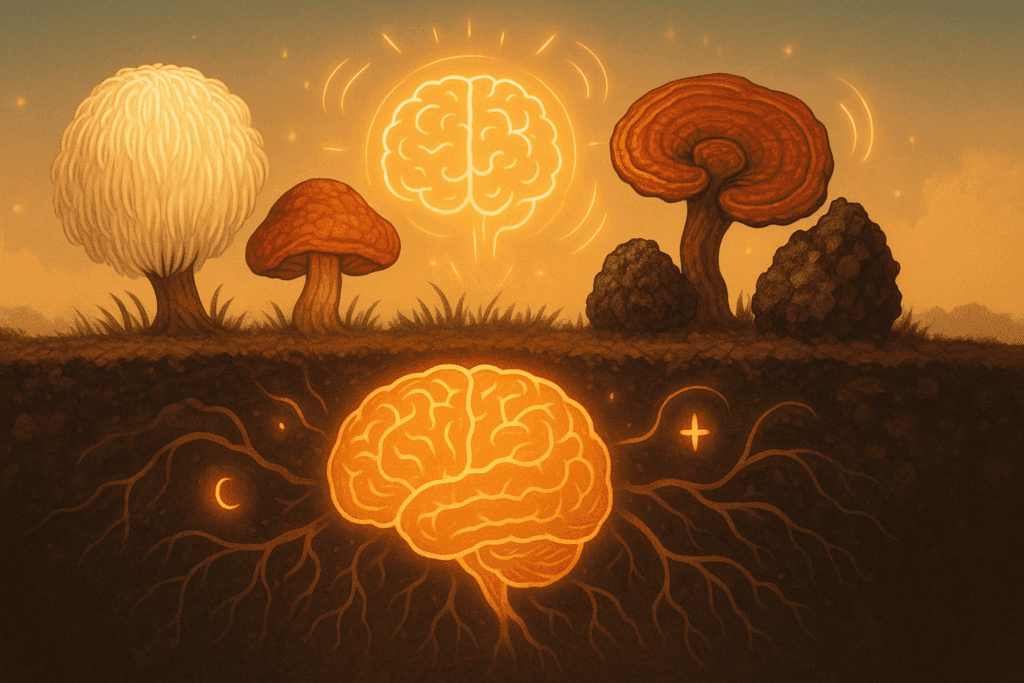
Understanding Nootropic Mushrooms and Their Unique Benefits
Nootropic mushrooms are a specific subset of functional fungi recognized for their brain-boosting properties. Unlike standard culinary mushrooms, these species contain bioactive compounds that have a profound influence on neural pathways, synaptic plasticity, and neurotransmitter production. The appeal of these mushrooms lies in their adaptogenic qualities, neuroprotective effects, and ability to enhance memory, attention, and overall cognitive function without the crash associated with synthetic stimulants.
What sets nootropic mushrooms apart is their synergistic blend of polysaccharides, terpenoids, and antioxidant compounds. These elements contribute to neurogenesis, reduce inflammation, and improve blood flow to the brain. Because they are non-habit-forming and generally safe for long-term use, these mushrooms are increasingly being recognized as among the best mushrooms for cognitive function.
The scientific community has also begun to validate their traditional use. Emerging research highlights their impact on neuroplasticity, myelination, and the production of Nerve Growth Factor (NGF) and Brain-Derived Neurotrophic Factor (BDNF), which are critical for brain health. For anyone pursuing natural and effective ways to support mental performance, these fungi provide a promising solution.
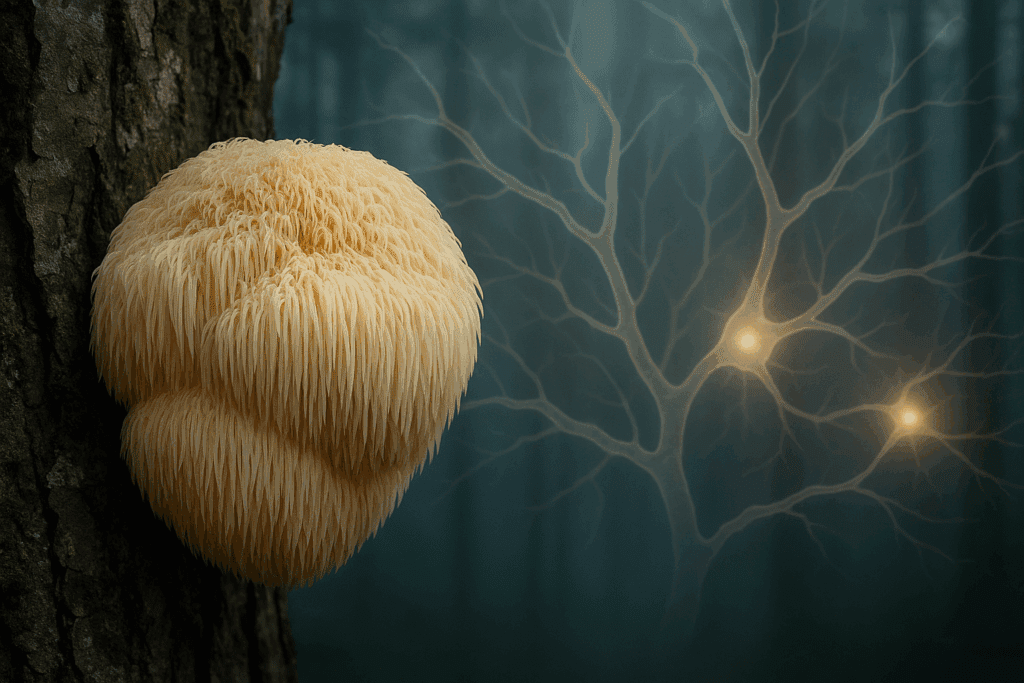
Spotlight on Lion’s Mane: The Best Mushroom for Memory and Cognitive Renewal
Among the best nootropic mushrooms available today, Lion’s Mane (Hericium erinaceus) stands out for its unparalleled neuroregenerative properties. This unique fungus, characterized by its shaggy appearance, has a long history of use in traditional Chinese medicine for improving cognitive health and emotional stability. Modern science has validated its efficacy in promoting the synthesis of NGF, a key protein that supports the survival and growth of neurons.
Studies have shown that Lion’s Mane may significantly improve memory recall, reduce symptoms of mild cognitive impairment, and boost mental clarity. It acts on the hippocampus, a region of the brain associated with learning and memory, and helps prevent age-related cognitive decline. This makes it a leading candidate in any ranking of the best mushrooms for memory.
Additionally, Lion’s Mane supports the central nervous system by reducing inflammation and oxidative stress—two key factors that accelerate brain aging. As a result, it is frequently featured in mushroom powder reviews and recommended in best mushroom blend for brain health formulas. Whether consumed as a supplement, extract, or incorporated into culinary dishes, its cognitive benefits are profound and well-documented.

Reishi and Cordyceps: The Best Mushrooms for Energy and Focus
While Lion’s Mane is lauded for memory enhancement, other mushrooms offer complementary benefits essential to cognitive performance. Reishi (Ganoderma lucidum) and Cordyceps (Cordyceps militaris) are two standout examples, known for their energy-boosting and adaptogenic properties. These mushrooms don’t merely stimulate the brain; they fortify the body’s resilience to stress, improving overall stamina and mental endurance.
Reishi is often described as the “mushroom of immortality” due to its calming and restorative qualities. It modulates the immune system, supports sleep quality, and balances mood—all factors that indirectly support cognitive health. Cordyceps, on the other hand, enhances cellular energy production by boosting ATP synthesis, making it one of the best mushrooms for energy and focus. Athletes and high-performance professionals often turn to Cordyceps for its ability to enhance oxygen utilization and reduce fatigue.
When taken together in a high-quality blend, Reishi and Cordyceps can provide a stable, long-lasting energy lift that supports attention span, motivation, and productivity. This synergy explains their inclusion in many of the best mushroom powder blends and their growing reputation as integral components of the best nootropic mushrooms.

Best Adaptogenic Mushrooms for Resilience and Mental Clarity
Adaptogens are natural substances that help the body adapt to stress and maintain balance. Many nootropic mushrooms double as adaptogens, offering a twofold benefit: they support both the mind and the body. Among the best adaptogenic mushrooms are Chaga (Inonotus obliquus), Turkey Tail (Trametes versicolor), and Maitake (Grifola frondosa). These fungi are rich in beta-glucans, antioxidants, and immune-modulating compounds.
Chaga is particularly valued for its ability to reduce inflammation and oxidative damage, making it a powerful ally for mental clarity and long-term brain health. Turkey Tail enhances gut health, which has been increasingly recognized as a key factor in mood and cognition due to the gut-brain axis. Maitake supports hormonal balance and stabilizes blood sugar levels, both of which are important for steady energy and cognitive function.
By incorporating these mushrooms into a daily wellness routine, individuals can enhance their ability to focus, stay calm under pressure, and remain mentally sharp. These benefits are why they often appear in the best mushroom blend for brain health and are praised in mushroom powder reviews for their subtle yet significant effects.
Exploring the Best Mushroom Powder Blends for Cognitive Synergy
One of the most convenient and effective ways to benefit from nootropic mushrooms is through powdered blends. These formulations combine several mushroom species to create a synergistic effect, amplifying their individual benefits. The best mushroom powder blends typically include a mix of Lion’s Mane, Reishi, Cordyceps, and adaptogens like Chaga or Turkey Tail.
These blends offer flexibility in consumption, allowing users to add them to smoothies, teas, or meals. They are especially popular among individuals seeking a daily ritual that supports long-term cognitive function. Additionally, the powders are often standardized for active compounds such as polysaccharides and beta-glucans, ensuring consistent potency.
Mushroom powder reviews often emphasize the importance of purity, sourcing, and extraction method. Dual extraction—which uses both water and alcohol—is preferred because it captures a broader range of bioactive compounds. When evaluating options, look for brands that use organic, fruiting body-only ingredients and avoid fillers. Products that meet these criteria consistently rank as the best mushroom powder blends.
Liquid Formulations: The Rise of the Best Mushroom Drops
As interest in nootropic mushrooms grows, so does the variety of available delivery methods. Mushroom drops, also known as tinctures or liquid extracts, are becoming a popular alternative to capsules and powders. These products offer rapid absorption and are easy to incorporate into daily routines.
The best mushroom drops are typically full-spectrum, meaning they include both mycelium and fruiting body extracts to capture the full range of beneficial compounds. These formulations are ideal for those who prefer a more bioavailable option or have difficulty digesting capsules or powders. Because they can be taken sublingually or added to beverages, mushroom drops provide a flexible and fast-acting solution for busy lifestyles.
Users often report enhanced focus, mood balance, and mental clarity within days of consistent use. For people interested in achieving cognitive benefits without the bulk or preparation associated with powders, the best mushroom drops offer an efficient and potent alternative. Many of these products are also featured in mushroom powder reviews, as their benefits are comparable or superior depending on extraction quality.
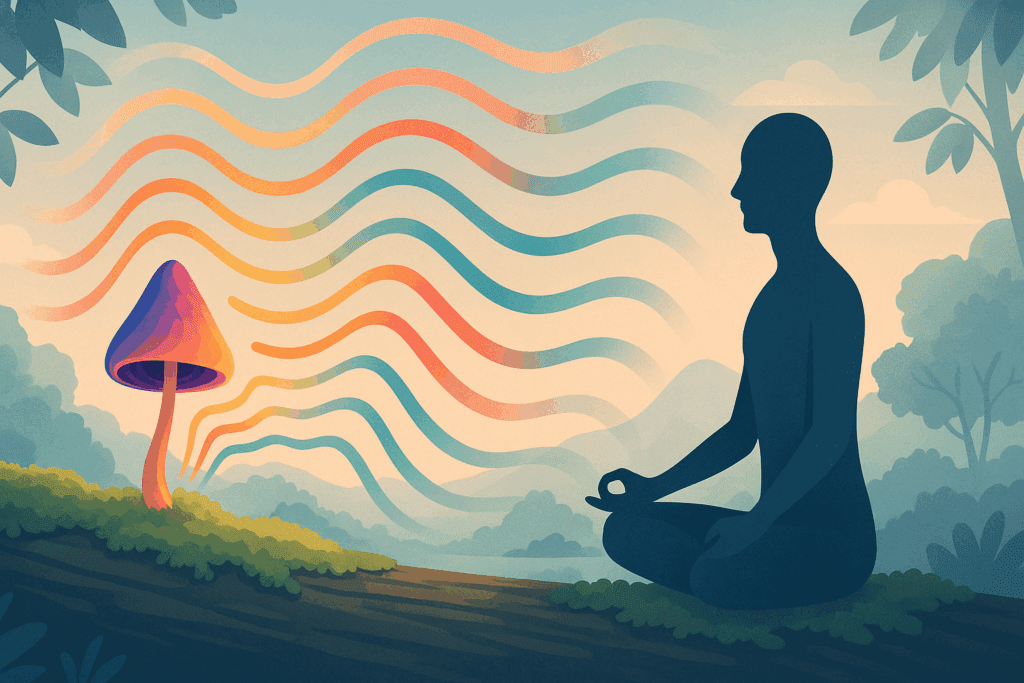
Psilocybin and Cognitive Enhancement: Understanding the Best Psilocybin Supplement
While much of the focus has been on non-psychoactive mushrooms, interest in psilocybin—the active compound in psychedelic mushrooms—has surged in both clinical and consumer spaces. Recent studies suggest that microdosing psilocybin may enhance creativity, emotional resilience, and cognitive flexibility. As such, discussions about the best psilocybin supplement are becoming increasingly relevant in conversations about brain health.
It is crucial, however, to approach psilocybin with caution and respect. Unlike other nootropic mushrooms, psilocybin-containing fungi are psychoactive and may produce hallucinogenic effects at higher doses. Microdosing protocols, typically involving very small amounts taken every few days, are being explored for their potential to support neuroplasticity, mood regulation, and even the treatment of depression and PTSD.
Though currently regulated in many countries, psilocybin is being decriminalized and studied extensively for therapeutic purposes. If legal and medically supervised, the best psilocybin supplement may one day be part of a comprehensive cognitive enhancement regimen. Until then, ongoing research continues to illuminate its promising future among the best mushrooms for brain health.
Mushrooms That Help with Memory: Beyond the Basics
In addition to the well-known species discussed earlier, other lesser-known mushrooms are gaining recognition for their memory-enhancing properties. Species like Poria cocos, Agaricus blazei, and Enokitake offer unique bioactive profiles that support synaptic health, cerebral circulation, and neurotransmitter balance.
Poria cocos has traditionally been used in Eastern medicine to calm the mind and support mental clarity. Its anti-inflammatory and antioxidant effects help create an optimal environment for memory formation and retention. Agaricus blazei is rich in beta-glucans and may support immune balance, which in turn promotes neurological well-being.
Enokitake, known for its delicate, noodle-like appearance, contains potent antioxidants and polysaccharides that protect against neurodegeneration. These mushrooms are often included in advanced formulations and are increasingly studied for their role in supporting memory and cognitive longevity. They represent the next frontier in the search for the best mushrooms for cognitive function.
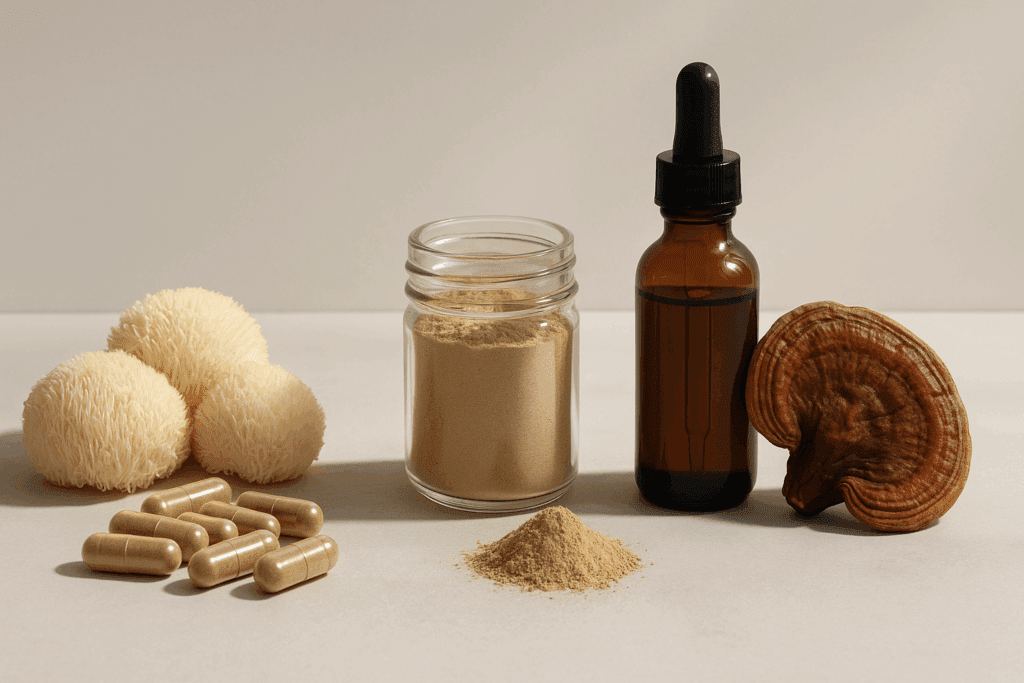
How to Choose the Best Nootropic Mushrooms for Your Needs
Selecting the right nootropic mushroom supplement depends on individual goals, lifestyle, and health status. Factors such as desired outcomes (e.g., memory improvement, focus, energy), preferred delivery method (e.g., powder, capsule, drops), and budget all play a role. It is essential to read labels carefully, verify third-party testing, and choose products with transparent sourcing.
For example, someone experiencing mental fatigue may benefit from a blend featuring Lion’s Mane and Cordyceps, while a person seeking stress resilience might prioritize Reishi and Chaga. Those looking for convenience may opt for the best mushroom drops, whereas those focused on long-term regimen adherence might prefer powders or capsules.
Consulting a healthcare professional is advisable, particularly for individuals with underlying health conditions or those taking medications. Nootropic mushrooms can interact with other supplements or treatments, and their effects can vary widely based on dosage and individual response. When chosen mindfully, however, these fungi offer a safe, natural, and effective way to enhance brain performance.
The Best Mushrooms for Energy and Focus: Natural Solutions That Work
In the ever-demanding pace of modern life, sustaining mental stamina and physical energy has become a priority for professionals, students, and older adults alike. Mushrooms have quietly emerged as potent natural enhancers of energy and concentration. While caffeine and synthetic nootropics often lead to jitteriness and crashes, certain medicinal mushrooms provide a balanced, sustained boost to mental clarity and endurance.
Cordyceps, in particular, is often celebrated as the best mushroom for energy and focus. This fungus enhances ATP production—the primary energy currency of cells—thereby supporting mitochondrial function and endurance. Whether you’re facing an intense workday or engaging in athletic training, Cordyceps can help reduce fatigue and elevate performance without overstimulation. Reishi, although traditionally associated with relaxation, plays a complementary role by modulating stress responses. It supports adrenal function and improves the quality of sleep, which in turn reinforces daytime focus and energy.
The best mushrooms for energy and focus often work synergistically, especially when paired in professionally formulated blends. These blends are frequently included in the best mushroom powder blends or liquid extracts for daily cognitive support. Incorporating them into your routine may provide a gentle yet profound lift in alertness, productivity, and emotional resilience.
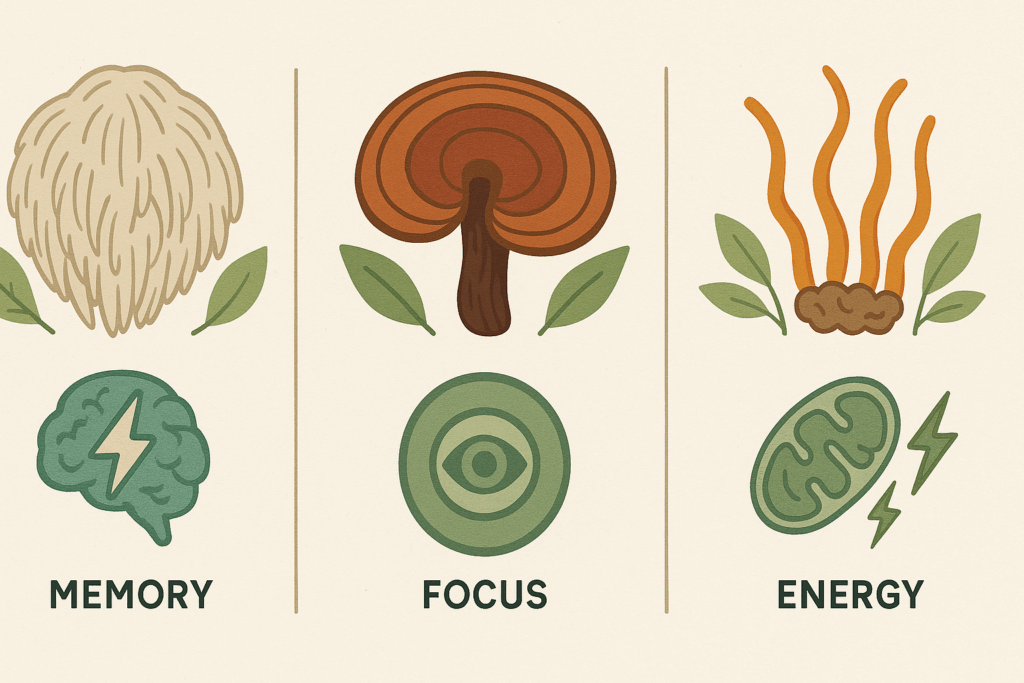
Unlocking the Best Mushroom for Brain Function Through Scientific Discovery
Scientific exploration of mushrooms has accelerated in recent years, and researchers are uncovering powerful mechanisms that explain their impact on brain health. Many mushrooms influence the expression of neurotrophic factors, modulate inflammation in neural tissue, and support mitochondrial function—all essential for optimal cognition. Among these, Lion’s Mane continues to stand out as the best mushroom for brain function due to its ability to regenerate nerve cells and improve communication between neurons.
Neurogenesis, the process of forming new neurons, was once thought to occur only in early development. However, compounds in Lion’s Mane have shown the ability to stimulate this process even in adult brains. This discovery holds great promise not only for memory enhancement but also for reversing the effects of aging, trauma, or neurodegenerative conditions. As a result, it’s now considered a core ingredient in many of the best mushroom blends for brain health.
Furthermore, the cognitive effects of mushrooms like Lion’s Mane, Reishi, and Cordyceps are being evaluated in human clinical trials, offering hope for developing evidence-based therapies. With ongoing research, consumers can expect increasingly targeted formulations of the best nootropic mushrooms to support specific brain functions such as focus, learning, memory consolidation, and executive function.
Frequently Asked Questions About the Best Nootropic Mushrooms for Brain Health
1. What makes the best nootropic mushrooms different from other brain supplements?
The best nootropic mushrooms distinguish themselves through their multifaceted support of the brain, acting on both structural and functional levels. Unlike synthetic brain supplements that often target a single neurotransmitter pathway, mushrooms support neuroplasticity, stress modulation, and mitochondrial efficiency simultaneously. Their natural compounds promote the release of growth factors like BDNF and NGF, which contribute to the long-term regeneration of neurons. Additionally, they often come with adaptogenic properties, helping the body maintain balance under chronic stress. This integrative mechanism makes the best nootropic mushrooms an increasingly preferred choice for sustainable cognitive enhancement.
2. How do the best mushrooms for memory impact age-related cognitive decline?
Mushrooms that help with memory, such as Lion’s Mane and Enokitake, offer neuroprotective compounds that address the oxidative stress and inflammation often associated with aging. These mushrooms help preserve the integrity of the blood-brain barrier and support the longevity of hippocampal cells. Moreover, the best mushrooms for memory also aid in preserving synaptic density, which plays a key role in memory retention and recall. Emerging studies show that these mushrooms can delay or even reverse early signs of mild cognitive impairment in aging populations. For those concerned with age-related decline, integrating the best nootropic mushrooms can provide both preventative and therapeutic benefits.
3. Are the best mushroom drops more effective than powders or capsules?
The best mushroom drops offer a unique advantage in bioavailability and ease of use. Because they are typically alcohol or glycerin-based tinctures, these drops allow for faster absorption into the bloodstream compared to powdered or encapsulated forms. This makes them particularly useful for individuals seeking rapid cognitive effects, such as enhanced clarity before presentations or exams. While they may not always contain the same concentration as some powdered extracts, their full-spectrum formulation often makes up for it. For maximum effectiveness, many users alternate between the best mushroom drops and the best mushroom powder blends depending on daily cognitive demands.
4. What role do the best adaptogenic mushrooms play in long-term brain health?
The best adaptogenic mushrooms like Reishi, Chaga, and Maitake serve as internal regulators, helping the body and mind adapt to chronic stress, fatigue, and environmental toxins. While not always labeled strictly as nootropics, these mushrooms enhance resilience, reduce systemic inflammation, and balance cortisol levels—all of which have downstream benefits for the brain. For instance, Reishi has been linked to improved sleep architecture, which is essential for memory consolidation and emotional processing. Chaga supports antioxidant defenses that protect neuronal structures, making it an underrated ally among the best mushrooms for brain health. When used consistently, adaptogenic mushrooms form the foundation for long-term neurological vitality.
5. What is the best mushroom for brain optimization during stressful periods?
During periods of heightened stress, Cordyceps emerges as the best mushroom for brain and body synchronization. Known for its ability to enhance cellular energy through increased ATP production, Cordyceps supports both mental alertness and physical stamina. Its adaptogenic qualities make it particularly effective in reducing adrenal fatigue, a common barrier to optimal cognitive performance. When paired with Lion’s Mane, Cordyceps creates a dynamic duo that sharpens focus while maintaining emotional equilibrium. This makes them frequent features in the best mushroom blend for brain health during peak workload or exam seasons.
6. Are there clinical studies supporting the best mushrooms for cognitive function?
Yes, a growing body of peer-reviewed research supports the efficacy of the best mushrooms for cognitive function. For instance, randomized clinical trials have demonstrated that Lion’s Mane can significantly improve cognitive scores in adults with mild cognitive impairment. Other studies show that Cordyceps enhances endurance and oxygen utilization, which can indirectly support brain performance. Additionally, laboratory studies on Reishi reveal its potential to reduce anxiety symptoms and modulate neurotransmitter activity. This evidence supports the inclusion of these fungi in the best nootropic mushrooms and reinforces their use as part of a science-backed wellness regimen.
7. How can I personalize my stack using the best mushroom powder blends?
Customizing your cognitive support stack with the best mushroom powder blends involves identifying your specific needs—be it memory, focus, or energy—and selecting fungi that match those goals. For example, if you’re seeking enhanced concentration and clarity, a blend containing Lion’s Mane, Cordyceps, and Reishi can be ideal. Those focused on emotional balance might add Turkey Tail or Maitake for their immune and mood-regulating effects. It’s also wise to rotate blends seasonally or based on workload to avoid adaptation plateaus. Many advanced users layer mushroom powders with nootropic amino acids like L-theanine or acetyl-L-carnitine for amplified effects.
8. How do mushrooms that help with memory interact with traditional medications?
Mushrooms that help with memory often work via anti-inflammatory and antioxidant mechanisms, which may complement rather than compete with many pharmaceuticals. However, certain species like Reishi may affect blood pressure or blood sugar, potentially interacting with medications for hypertension or diabetes. Lion’s Mane may influence nerve growth factors, so those taking drugs affecting neural signaling should consult a healthcare provider. When integrating the best nootropic mushrooms into a health regimen that includes medications, monitoring for synergy or contraindications is crucial. Working with a naturopathic doctor or integrative physician can help ensure a safe and effective protocol.
9. What are the emerging trends in the use of the best nootropic mushrooms?
One of the most exciting trends is the integration of mushroom-based nootropics into wearable biosensor technologies and AI-driven health platforms. These innovations allow users to monitor cognitive metrics like reaction time, memory, and mood in real-time, enabling dynamic adjustments to supplement dosing. Additionally, companies are beginning to combine the best mushrooms for energy and focus with cannabinoids, adaptogenic herbs, and prebiotics to create multi-layered cognitive stacks. There’s also a growing interest in fermentation-based extraction methods, which may yield more bioavailable compounds than traditional hot water or alcohol extractions. As the field evolves, the best nootropic mushrooms will likely become central players in next-generation brain optimization protocols.
10. Can microdosing the best psilocybin supplement be part of a cognitive health strategy?
Microdosing the best psilocybin supplement is gaining attention as a cutting-edge tool for cognitive and emotional resilience. Though psilocybin is psychoactive at higher doses, microdoses (typically one-tenth of a recreational dose) are sub-perceptual and designed to subtly enhance mood, creativity, and neuroplasticity. Some users report improved problem-solving, heightened emotional intelligence, and reduced symptoms of depression when using structured microdosing protocols. While still in its experimental phase, psilocybin microdosing is being evaluated in clinical settings, with early findings suggesting potential for safe, long-term cognitive support. As research continues, psilocybin may eventually join the ranks of the best nootropic mushrooms, particularly in the context of mental health and personal growth.
Conclusion: Unlocking the Potential of the Best Nootropic Mushrooms for Brain Health
As scientific inquiry continues to validate the ancient wisdom surrounding medicinal mushrooms, their place in cognitive health strategies becomes increasingly secure. From Lion’s Mane’s neurogenic capabilities to Cordyceps’ energizing effects, these fungi offer a rich spectrum of benefits. Whether in the form of the best mushroom powder blends, best mushroom drops, or best psilocybin supplement under appropriate guidance, these substances provide a nuanced, multifaceted approach to mental clarity and resilience.
Incorporating the best nootropic mushrooms into your lifestyle is not merely a trend—it’s an evidence-based strategy to optimize memory, focus, and overall brain vitality. With their adaptogenic support, immune modulation, and neural repair mechanisms, these mushrooms represent a powerful, natural toolkit for anyone seeking sustainable cognitive enhancement.
As with any wellness intervention, the key lies in consistency, quality, and personalized selection. By staying informed and choosing high-quality, responsibly sourced supplements, individuals can harness the transformative potential of mushrooms that help with memory, enhance focus, and support lifelong cognitive health.
The future of brain health may very well be rooted in the forest floor, in the intricate mycelial networks and fruiting bodies of nature’s most intelligent fungi. Embracing the best mushrooms for brain health is not only a return to nature but a step forward in the science of human potential.
Further Reading :
How Medicinal Mushrooms Boost Your Brain Health
Mushroom Supplements for Memory & Cognition
The Best Adaptogenic Mushrooms for Boosting Brain Power, Heart Health, and More
